By JULIE MINDA
For the first time ever, CHA is holding its annual member gathering in an online-only format. The virtual assembly will convene Monday, June 8, from 2:30 p.m. to 4 p.m. Eastern time. This year's Catholic Health Assembly was to take place in Atlanta, but association leadership converted the meeting into a virtual format to protect attendees' health, safety and well-being amid the pandemic.
The online assembly will provide CHA members with insights on how they can best prepare ministry systems and facilities for the post-COVID 19 world — and do so in a way that provides special considerations for the poor and vulnerable, according to Brian Reardon, CHA vice president of communications and marketing.
Reardon says, "We know that our annual assembly has always been a great opportunity for our members to connect with and learn from each other. While we can't gather in person, we still want to provide that experience in a virtual environment. This year, the presentations and discussions will be focused on how Catholic health care emerges from COVID-19. My hope is those attending will gain some new ideas about how Catholic health care can work collectively to address the many different challenges presented by this public health crisis."

Metzl
CHA members are looking very closely at how the pandemic is changing, and will continue to change, how they deliver care, including the ways that the adoption of artificial intelligence, telehealth and other technology is accelerating at even more of a rapid pace than it was before the pandemic hit. "Jamie Metzl will address how we leverage these tools in a way that is consistent with our core values," Reardon says.
Metzl's replies to written questions from Catholic Health World indicate that he believes that the social and economic crisis triggered by the pandemic provides an opportunity to shape a more equitable society. "Before the pandemic, we had all gotten so used to our broken world that we all-too-often accepted terrible things as normal. A world where 3 billion people live in poverty and where there are such massive health and life disparities between the least and most privileged among us was never a stable world.
"If we want to build a world where we can each be safe, we must build one where we can all be safe." He writes that helping provide essential health care to everyone is an important first step in that process, but efforts cannot end there — the efforts must address many other inequities as well.
"This terrible pandemic has been a wakeup call for all of us," he says. "We've now got to build back better."
Metzl sees a central role for the Catholic Church's ministries in this rebuilding. He says he has followed the work of Catholic charities and the Catholic health care community for many years and has witnessed that these church ministries are "at the forefront of efforts to make sure the most vulnerable among us are cared for."
When it comes to rebuilding from the pandemic, he says, "Human dignity must be at the center of all our work. The Catholic health care community has been a leader of efforts to expand access to health care. This work is now more important than ever. Now that we have seen in such stark relief the terrible cost of our current health care disparities, there might be a unique opportunity to build a system that can provide quality health care to everyone.
"In addition to being a service provider, the Catholic health care community can — and perhaps should — become a system reformer."
Metzl has written about technology, health care and geopolitics. He is a senior fellow for technology and national security of the Atlantic Council, an international affairs think tank; an appointee to a World Health Organization advisory committee on developing global standards for human genome editing; and a founder and co-chair of the national security organization Partnership for a Secure America. He's been working with the Vatican's Pontifical Council for Culture on the ethics of human genetic engineering and has engaged faith leaders in the U.S. on issues related to technology and humanity.
He's worked for the U.S. National Security Council, the State Department and the Senate Foreign Relations Committee. He was a human rights officer for the United Nations in Cambodia. He speaks regularly at progressive venues including South by Southwest, Google Zeitgeist and Singularity University. He is a frequent guest on broadcast programs including Bloomberg, the BBC, CBS and CNN. He's been published in The New York Times, Washington Post and Foreign Affairs. He's written novels related to the Cambodian genocide and to genetics.
Reardon says, "We wanted to bring in a speaker who could share their expertise on what health care leaders can expect in the months and years ahead. As a best-selling author and geopolitical expert, Jamie will bring a wealth of knowledge and experience and some great insights to our meeting."
Reardon noted that based on the 822 registrations completed so far for the virtual assembly, CHA expects to have about the name number of people attend the assembly virtually this year as attended the annual meeting last year in Dallas.
Preregistration is required to attend the virtual assembly and participation is restricted to CHA members. There is no cost to register. To register, visit chausa.org/events/virtual-assembly-2020 and click on the registration link. The deadline to sign up is June 8 at 10 a.m. Eastern time. CHA members will be able to access a recording of the virtual assembly for a limited time after the original broadcast.